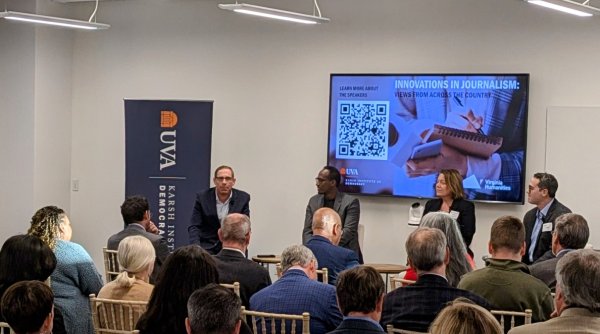
Local news is an essential building block of a vibrant democracy.
“The shuttering of local media outlets, underfunded newsrooms, and declining trust in information, more broadly, threaten the nation's democratic health,” said Karsh Institute Director of Programming Stefanie Georgakis Abbott.
The shuttering of local media outlets, underfunded newsrooms, and declining trust in information, more broadly, threaten the nation's democratic health
For the past two years, the Karsh Institute has partnered with Virginia Humanities to host convenings that examine how to combat this challenge. Last fall, experts from across the country came together at the Karsh Institute to explore innovations in local journalism and its role in strengthening communities and democratic culture, drawing journalists, scholars, students, and other practitioners from across the state for an evening of conversation and networking.
The keynote panel focused on innovative new business and revenue models that media outlets are using in different states to continue growing their readerships. It featured Mary Margaret White, CEO of Mississippi Today, Matt Wynn, executive director of the Nebraska Journalism Trust, and Mukhtar Ibrahim, former executive director of the Sahan Journal, and was moderated by Evan Smith, a Karsh Institute advisory board member and co-founder and former CEO of the Texas Tribune.
The following day, panelists joined another group of stakeholders from across the Commonwealth to discuss the success of the Press Forward Locals program, a network of 31 chapters across the country where funders bring new donors and foundations together to expand resources for local news. Participants explored the structure of Press Forward Local chapters: How are they organized in their part of the country? How do the chapters differ on a state versus community level? And how might a Press Forward local chapter be organized in Virginia?
Press Forward local chapters offer an opportunity to create place-based initiatives that address the specific information needs of individual localities. According to Press Forward, the chapters are deeply connected to their communities, enabling members to identify authentic approaches to meeting a community's information needs while uniting supporters around a shared vision for local news.
In spring 2025, the Karsh Institute will again partner with Virginia Humanities to release the results of the inaugural Virginia Local News Ecosystem Study, establishing a baseline analysis of all outlets offering news and information in Virginia. The study is also being supported by More Perfect, the American Press Institute, and the PATH Foundation.
The Karsh Institute will again partner with Virginia Humanities to release the results of the inaugural Virginia Local News Ecosystem Study, establishing a baseline analysis of all outlets offering news and information in Virginia.
"Without an understanding of the local news ecosystem in Virginia, stakeholders lack the information needed to develop targeted, sustainable interventions," said Karsh Institute Director of Research Jessica Kimpell Johnson.
Without an understanding of the local news ecosystem in Virginia, stakeholders lack the information needed to develop targeted, sustainable interventions
Establishing this baseline will enable stakeholders to identify specific areas of need and collaboratively develop solutions to support local journalism in Virginia. Using a model developed by the University of Maryland’s Philip Merrill College of Journalism, the Ecosystem Study will result in a detailed report on the Virginia local news landscape along with content and convenings for wider audiences.
“It’s an ambitious undertaking,” said Kimpell Johnson, “and a first step in better understanding the nature of media outlets vis-à-vis their location and the kind of news coverage they are offering. And it’s a beginning for assessing how people are consuming information in the Commonwealth.”